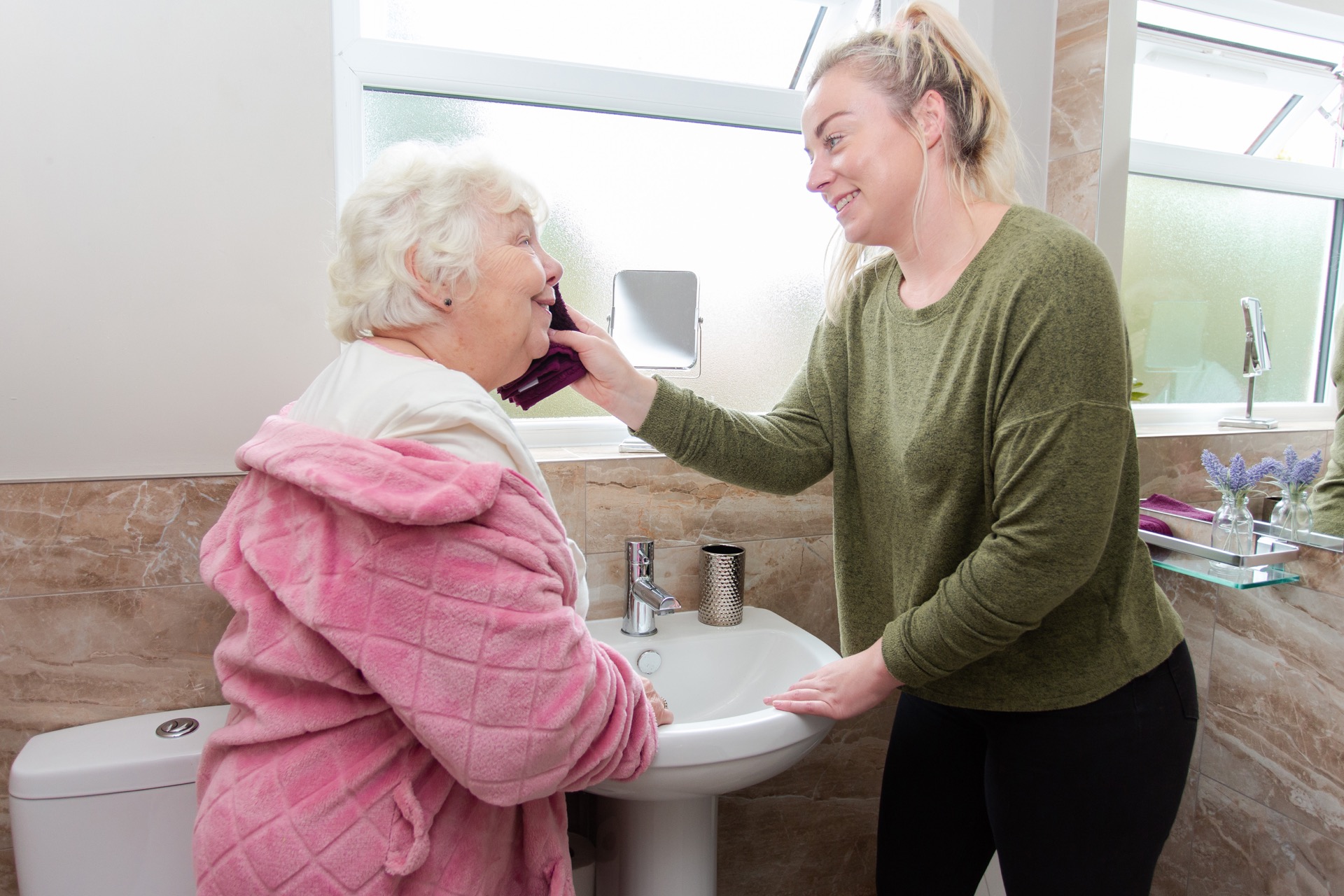Alzheimer’s care

Specialist care within the comfort of your home
We believe in the benefits of allowing someone with Alzheimer’s to remain in their own home.
Alzheimer’s is the most common form of dementia, affecting more than half a million people a week in the UK alone, and the one that we’re asked to support with the most. It is a progressive condition, leaving the people and families affected needing extra help and care. At Helping Hands, we believe in and see the benefits of allowing someone with Alzheimer’s to remain in their own home. The continuity of routine, familiarity of environment and one to one attention from a specialist dementia care giver can make a huge difference to quality of life.

Support with Alzheimer’s symptoms
Our carers are expertly trained to provide support for the specific symptoms of Alzheimer’s.
People affected by Alzheimer’s experience a range of symptoms, so an Alzheimer’s care plan tailored to the individual is a necessity. We work with our customers, their families, their GPs and professionals from other healthcare organisations to deliver a package of Alzheimer’s support that meets the needs of the person. Some of the typical symptoms of Alzheimer’s include:
Confusion with time and place
People affected by Alzheimer’s often find themselves unsure about time, place, where they should be or what they need to do. We can provide help with calendar management, assist them out and about, and be a constant source of comfort.
Struggling with social interaction
A Helping Hands Alzheimer’s carer is warm, friendly and full of enthusiasm. As well as always being around for a chat over a cup of tea, our carers can provide support with social routines and activities when caring for someone with Alzheimer’s.
Changes in behaviour
With time, Alzheimer’s impacts the functions carried out by the brain, resulting in behavioural changes. One-to-one support means carer and customer can form a relationship, so there’s never any shock or anger at changes in behaviour.
Withdrawal from social activities
Our friendly, supportive carers can help you maintain a social life and continue to enjoy your favourite activities. Whether you’re visiting loved ones, hosting family or attending a club, your carer will be able to help you get the most out of life.
Decline in memory
Our carers work with their customers to create memory boxes and scrapbooks, featuring photographs and other sentimental tokens to help stimulate memories. You and your loved one can also rest assured that they’re always around to reassure, prompt and assist – for example, reminding them to feed the dog, put the washing machine on or take their medication.
Difficulty completing basic activities
Although our Alzheimer’s support services are primarily focused around the medical needs of our customers, our carers are also on hand to provide help round the home. They can help people with basic tasks they might struggle with – from making a sandwich or vacuuming to filling out prescriptions or putting the bins out – whilst encouraging them to be as involved as possible.
The importance of Alzheimer’s support in the home

Consistency is a key part of support, especially when caring for someone with Alzheimer’s.
Moving an individual affected by this illness into an environment they’re unfamiliar with, such as a residential care home, can have a negative impact. It can cause distress, confusion and discomfort. With Alzheimer’s home care, an individual can get the medical support they need in the place they know and love best – their own home. Homes aren’t just buildings – they hold memories, items with lots of sentimental value and photographs – and all of this can help to stimulate the memory.
Why stay at home for Alzheimer’s care?
Staying at home for Alzheimer’s care means you get a truly person-centred support plan.
At Helping Hands, we firmly believe that home is the very best place in which to receive the dedicated care you need for Alzheimer’s. Staying at home allows you to remain in the place you love, surrounded by familiar sights, sounds and smells. Our carers always look to maintain existing routines and lifestyles, so you or your loved one never have to worry about adapting to change.

Here are just some of the benefits of Alzheimer’s home care:
Personalised support
Domiciliary care allows you to enjoy a personalised care plan that ensures you’re always getting the right support for your needs and wishes
A holistic approach
Our holistic approach means no stone is left unturned in your care plan, so you’ll get the emotional, practical and physical support you need
Stay in a familiar environment
Many people relish the chance to remain in the comfortable, secure surroundings of home whilst receiving the additional support they need
Spend more time with loved ones
You’ll be able to choose when your family and friends visit, and your carer can assist with hosting duties – including getting your home spick and span
One-to-one care
Home care gives you the opportunity to receive personal one-to-one support from your own carer, meaning you’ll always have their full attention
Maintain your routines and hobbies
Domiciliary care allows you to continue living life on your own terms, which includes keeping up all your favourite hobbies, routines and activities


How Alzheimer’s care at home can support you
Your Alzheimer’s carer will be able to offer fully tailored care to suit the needs of your condition.
All of our carers are fully trained to provide a wide range of specialist support services for people living with Alzheimer’s. Whatever stage of the condition you’re at, your Helping Hands carer will be able to support you in a number of ways around the home.

How a carer can help:
Personal care
Your Alzheimer’s carer can provide discreet and dignified personal care with routines such as bathing, toileting and getting dressed
Household tasks
Your carer can help around your home with housekeeping tasks like cleaning and vacuuming, doing the laundry, and doing the bins
Mobility support at home
Every Helping Hands carer is trained in mobility support, so they can help with things like getting in and out of bed and moving around the home
Light medical support
Our fully trained carers can provide light medical help including catheter care, PEG feeding and suppositories, to name just a few
Friendly companionship
All of our carers have been handpicked for their kind, compassionate personalities, which means they also provide wonderful companionship
Getting out and about
Whether you want to visit family, pop to the shops or go away on holiday, a carer can help you plan your travel and accompany you along the way
Our wonderful Alzheimer’s carers
We’re extremely proud of our exceptional visiting and live-in Alzheimer’s carers. They truly are the very best in the industry, and are constantly going above and beyond to ensure every customer receives the exceptional standards of care that they’ve come to expect from Helping Hands. We’re committed to ensuring that every Helping Hands branch across the UK is built around our dedicated care teams.

Here are some of the many things that set our carers apart:
Kind, compassionate personalities
At Helping Hands, we have a rigorous recruitment process which means we only hire kind, empathetic carers who share our person-centred family values. All of our carers undergo numerous background checks to ensure they’ll be a perfect fit for you.
Industry-leading training
Before going into the homes of their customers, our Alzheimer’s carers go through intensive training either at our Centre of Excellence, or within their local branch. Here, they learn about the complexities of the illness and its symptoms.
A fully managed service
We ensure that consistency is at the core of our Alzheimer’s care plans. Our live-in carers usually work in blocks of six to eight weeks before taking a respite break. We’ll then provide a temporary carer to take over for a short period of time.
Fully regulated by the CQC / CIW
Here at Helping Hands, our live-in care service is fully managed and regulated by the Care Quality Commission (CQC).
From your very first phone call to our friendly team, every aspect of your home care service is independently monitored and regulated by the CQC and Care Inspectorate Wales (CIW).
Why is being a regulated company important?
What does regulation mean?
Every aspect of the care that we provide is monitored to ensure we meet industry standards
Why do we choose to be regulated?
We offer a regulated care service so that every customer can have full peace of mind at all times
How does regulation affect my care?
Your care will follow industry-wide procedures and be of the very high standard you would expect
How to arrange Alzheimer’s care
Arranging dedicated home care has never been simpler. Call our team today to get the ball rolling on your care journey with Helping Hands.
Speak to our team
Contact our friendly team to talk through your needs and preferences
Free home care assessment
A local care expert will visit you at home to organise your support plan
Find your carer
We’ll find you a carer who is perfect for your needs and circumstances
Alzheimer’s care FAQs
-
How do you care for someone with Alzheimer’s?
-
Those who have Alzheimer’s, or another form of dementia, require both patience and flexibility. Key things to consider are careful planning, creating a safe environment and focusing on the individual.
At Helping Hands, we offer Alzheimer’s care that puts the individual at the centre of their care journey.
-
Can a person with Alzheimer’s be left alone?
-
Every person with dementia is an individual so this will vary. As a generalisation though, when an individual has entered the moderate stage of Alzheimer’s and their daily life is becoming increasingly affected, it is no longer safe for them to be left alone.
-
At what point do Alzheimer’s patients need 24-hour care?
-
It can vary from person to person, but as the disease progresses into the later stages, their care needs will become more intensive.
-
How do I arrange Alzheimer’s care?
-
To arrange a package of Alzheimer’s care, simply give us a call. We’re here seven days a week to talk through your homecare needs and find the best package of care for you.
Page reviewed by Carole Kerton-Church, Regional Clinical Lead, on July 25, 2024.
How we wrote this page
This page has been produced referencing key insights and data from external experts, trusted medical sources and our team of in-house specialists. We have worked hard to ensure that all information is as accurate as possible and reflects current consensus at the time of writing and reviewing.